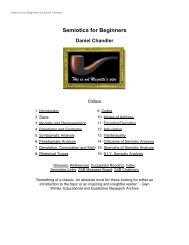Semiotics for Beginners by Daniel Chandler
Semiotics for Beginners by Daniel Chandler
Semiotics for Beginners by Daniel Chandler
You also want an ePaper? Increase the reach of your titles
YUMPU automatically turns print PDFs into web optimized ePapers that Google loves.
<strong>Semiotics</strong> <strong>for</strong> <strong>Beginners</strong> <strong>by</strong> <strong>Daniel</strong> <strong>Chandler</strong><br />
• Relative autonomy: This is a term adopted from Althusserian Marxism, where it refers to the relative<br />
independence of the 'superstructure' of society (including ideology) from the economic (or techno-economic)<br />
'base' (in contrast to the orthodox marxist stance that the latter determines the <strong>for</strong>mer - a stance similar to that of<br />
technological determinism). In the context of semiotics, Saussure's model of the sign assumes the relative<br />
autonomy of language in relation to 'reality' (it does not directly feature a 'real world' referent); there is no essential<br />
bond between words and things. In a semiotic system with double articulation the levels of the signifier and of the<br />
signified are relatively autonomous. The signifier and the signified in a sign are autonomous to the extent that<br />
their relationship is arbitrary (commentators also speak of 'relative arbitariness' or 'relative conventionality'). See<br />
also: Arbitrariness, Articulation, The bar, Constructivism, Conventionality, Idealism, Modes of relationship,<br />
Nomenclaturism, Primacy of the signifier<br />
• Relativism/relativity, cultural: See Cultural relativism<br />
• Relativism, epistemological: The term 'relativism' is frequently either a term of abuse used <strong>by</strong> critics of<br />
constructivism (notably realists, <strong>for</strong> whom it may refer to any epistemological stance other than realism) or <strong>by</strong><br />
constructivists themselves referring to a position where<strong>by</strong> 'anything goes' with which they do not want to be<br />
associated. Critics associate relativism with an extreme idealism or nihilism denying the existence of a real<br />
material world - which it does not necessarily entail. Since few theorists choose to label themselves relativists it is<br />
difficult to define the term adequately. One characterization is as the stance that there are numerous alternative<br />
versions of reality which can only be assessed in relation to each other and not in relation to any 'absolute', fixed<br />
and universal truth, reality, meaning, knowledge or certainty. Such categories are contingent - temporary,<br />
provisional and dependent on context and circumstances. Any defence of absolutes tends to be denounced as<br />
'metaphysics'. There can be no 'value-free' facts. Relativism is in tune with the emphasis in Saussurean<br />
structuralism on the relative position of signs within a signifying system rather than on 'things'. Relativism is an<br />
anti-essentialist position. The semiotic stance which problematizes 'reality' and emphasizes mediation and<br />
representational convention in the <strong>for</strong>m of codes is criticized as relativism (or extreme conventionalism) <strong>by</strong> those<br />
veering towards realism. Such critics often object to what they see as a sidelining of referential concerns which<br />
are foundational in realist discourse - such as truth, facts, accuracy, objectivity, bias and distortion. Even in<br />
relation to the interpretation of a text, the stance that meaning depends on how readers interpret it rather than<br />
residing 'within' the text has been criticized <strong>by</strong> literalists as relativism (see Affective fallacy). Critics sometimes<br />
note that relativists cannot logically make any general statements even about relativism. See also:<br />
Constructivism, Conventionalism, Cultural relativism, Epistemology, Essentialism, Idealism, Priorism, Realism,<br />
Reality, Relativism, linguistic, Representation, Universalism, cognitive, Whorfianism<br />
• Relativism/relativity, linguistic: Linguistic relativism is the view that every language is a unique system of relations<br />
and, more radically, that the phonological, grammatical and semantic distinctions in different languages are<br />
completely arbitrary. Thus, on the semantic level, reality is divided up into arbitrary categories <strong>by</strong> every language<br />
and different languages have different in-built ontologies. Concepts may not be translatable. Linguistic relativism<br />
emphasizes the contingency of signifieds. It is closely associated with epistemological relativism and is a<br />
fundamental assumption involved in Whorfianism. An opposing viewpoint is that of linguistic universalism. Both<br />
linguistic relativism and linguistic universalism are compatible with Structuralism. See also: Cultural relativism,<br />
Relativism, epistemological, Translatability, Universalism, linguistic, Whorfianism<br />
• Relativism/relativity, ontological: See Ontology<br />
• Representamen: The representamen is one of the three elements of Peirce's model of the sign and it refers to the<br />
<strong>for</strong>m which the sign takes (not necessarily material). When it refers to a non-material <strong>for</strong>m it is comparable to<br />
Saussure's signifier; whereas when it refers to material <strong>for</strong>m it is what some commentators refer to as the sign<br />
vehicle. See also: Peircean model of the sign, Signifier<br />
• Representation: In general usage, this term refers to the depiction of something in any medium in the <strong>for</strong>m of a<br />
text. However, as standard dictionaries remind us, a representation is something which stands <strong>for</strong> or in place of<br />
something else - which is of course what semioticians call a sign. <strong>Semiotics</strong> <strong>for</strong>egrounds and problematizes the<br />
process of representation. It is a widespread semiotic stance that reality is always represented - what we treat as<br />
'direct' experience is 'mediated' <strong>by</strong> perceptual codes - perception involves mental representation. Representation<br />
always involves 'the construction of reality'. All texts, however 'realistic' they may seem to be (as in audio-visual<br />
media), are constructed representations rather than simply transparent 'reflections', recordings, transcriptions or<br />
reproductions of a pre-existing reality. Except in the case of digitally-sourced reproductions, texts are constructed<br />
from different materials from that which they represent, and representations cannot be replicas. Whether through<br />
'direct' perception or mediated texts, what we experience as realities always involve codes. Representations<br />
which become familiar through constant re-use come to feel 'natural' and unmediated, and can even shape what<br />
we accept as reality (at least within a genre). In our daily behaviour we routinely act on the basis that some<br />
representations of reality are more reliable than others - we make modality judgements about them.




